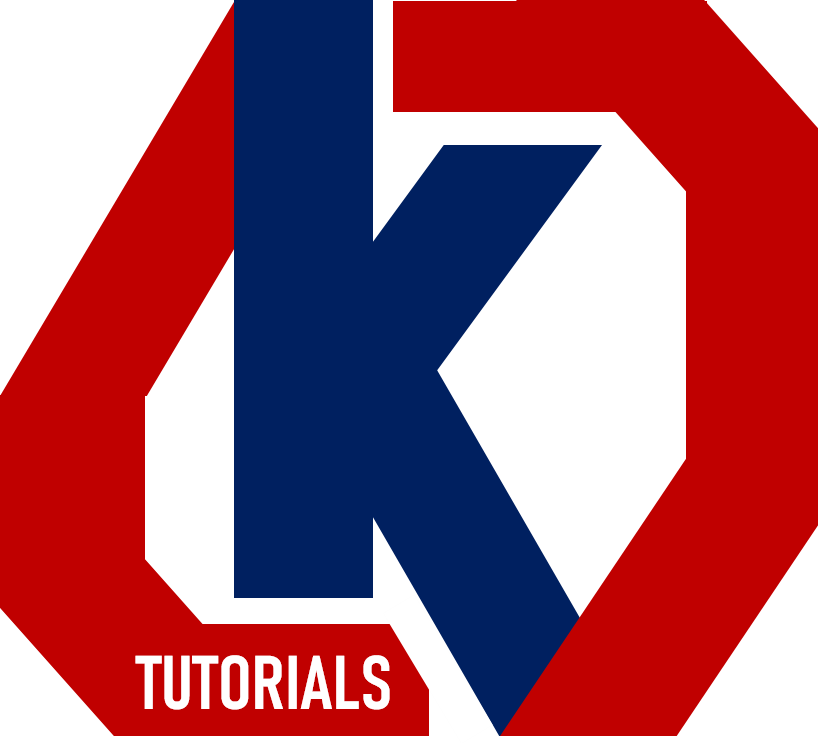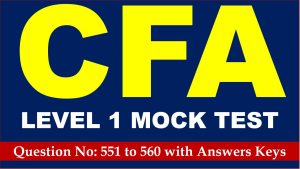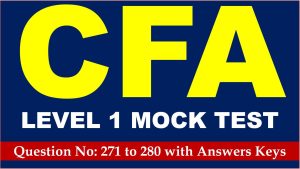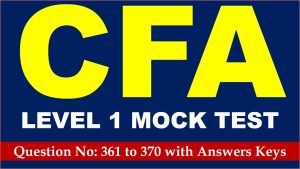Hi CFA Aspirants, welcome to AKVTutorials. Are you preparing for CFA Level 1, 2, 3 exams for making a career in CFA (Charted Financial Analyst). According to CFA Wikipedia, CFA The Chartered Financial Analyst (CFA) program is a postgraduate professional certification offered internationally by the American-based CFA Institute. A candidate who successfully completes the program and meets other professional requirements is awarded the “CFA charter” and becomes a “CFA charter holder”. Therefore, you need CFA Study Notes and Free CFA Level 1 Sample Quiz 10 Questions Answer Keys AMBIPi.
In this article, you will get Free CFA Level 1 Mock Exam Practice Questions.
Free CFA Level 1 Mock Practice Exam Questions Bank
Free CFA Level 1 Practice Question No: 91:
The ________ assumption must be disclosed if results are presented after taxes.
Option A : composite.
Option B : tax rate.
Option C : settlement-date.
Option D : selection.
Option E : trade.
Show/Hide Answer
Option B : tax rate.
To be in compliance with the PPS, a firm’s presentation of its investment performance must disclose the tax rate information.
CFA Level 1 Exam Question No: 92:
Standard IV (B.5), Preservation of Confidentiality specifically states that one may not enter into _________ that may prevent a party from cooperating with the Professional Conduct Program (PCP in its investigation of the member’s alleged violations of the Code and Standards.
Option A: settlement agreements.
Option B: confidential conversations.
Option C: priority dealings.
Option D: business relationships.
Show/Hide Answer
Option A : settlement agreements.
Under Standard IV (B.5), members are prohibited from executing settlement agreements that may prevent a customer or other party from providing information, documents, or testimony or otherwise cooperating with the PCP in its investigation.
Free CFA Level 1 Mock Exam Question No: 93:
When dealing with a trust, according to the Prudent Man Rule, trustees must:
Option A: apply “all reasonable efforts” to the remaindermen.
Option B: be impartial between income beneficiaries and remaindermen.
Option C: take into account income beneficiaries first, then the remaindermen.
Option D: take into account the remaindermen first, then the income beneficiaries.
Option E: apply “all reasonable efforts” to the income beneficiaries.
Show/Hide Answer
Option B : be impartial between income beneficiaries and remaindermen.
Under the Prudent Man Rule, trustees must be impartial between income beneficiaries and remaindermen and must achieve an equitable balance between current income and the preservation of principal in real terms.
CFA Level 1 Free Practice Question No: 94:
Standard IV (A.3) relates to two major components, Independence and Objectivity. Under this Standard, modest gifts that do not exceed ______ and entertainment are acceptable, without disclosure.
Option A: $100.
Option B: one-twentieth of your annual salary and bonus.
Option C: one-tenth of your annual salary and bonus.
Option D: $500.
Option E: none of these answers.
Option F: $1,000.
Show/Hide Answer
Option A : $100.
External sources may try to influence the investment process by offering analysts and portfolio managers a variety of “perks.” The perks may include gifts, invitations to lavish functions, tickets and so on. Modest gifts that do not exceed $100 and entertainment are acceptable, but special care should be taken by member analysts and investment managers to resist subtle and not-so
-subtle pressures to act in a manner possibly detrimental to their clients.
Free CFA Practice Question No: 95:
Jay Simpson was recently convicted of a felony in the state of California. Jay is a resident of Arizona, where he conducts all his business. The felony conviction resulted from activities not related to his primary business. With regard to standard II.B-Professional Misconduct, Jay has:
Option A: violated the standard since felony convictions are considered professional misconduct.
Option B: not violated the standard since the conviction occurred in a non-resident state.
Option C: not violated the standard since AIMR does not impose sanctions for felony convictions.
Option D: not violated the standard since the conviction is for non-business activities.
Option E: none of these answers.
Show/Hide Answer
Option A :
Standard I (B) is violated if convictions for felony or similar offenses occur, regardless of whether the offenses were related to the member’s professional activities or not.
CFA Level 1 Sample Question No: 96:
Which of the following will result in an insider trading prosecution?
I. A tippee trades based on inside information, not knowing that the source of the information has actually received the information illegally and has breached fiduciary duty to the shareholders by leaking it. He has no reasons to suspect such a behavior.
II. A corporate outsider who has absolutely no connections to any of the insiders misappropriates inside information and trades for profit based on that information.
III. A tippee trades based on inside information about an impending tender offer after verifying that the source of the information has not breached any fiduciary duty to the company.
Option A: I only.
Option B: III only.
Option C: I, II and III.
Option D: II and III only.
Show/Hide Answer
Option D : II and III only.
A “Tippee” is any person who learns inside information from a corporate insider. A tippee can be held liable under SEC’s section 10b and rule 10(b)-5 only if he knows or should know that the insider has behaved improperly and breached fiduciary duty in revealing the information. Otherwise, the tippee is not held responsible for insider trading. One exception to this rule is information about tender offers, in which tippee liability results automatically under SEC Rule 14-3, even if the insider has not breached any fiduciary duty. Under the Misappropriation Theory of insider trading, a person who misappropriates inside information and trades or abets trading in it is committing securities fraud and can be so charged, even if the person is a complete corporate outsider. The Topical Study, “Insider Trading,” is probably the most important (and the trickiest) section in the handbook and you can expect at least one question from it.
Free CFA Level 1 Quiz Question NO: 97:
An AIMR member:
1. must report any criminal activity to the appropriate legal or regulatory authority.
II. may be held responsible for any illegal activity he associates himself with.
III. may be held liable for violations by others when he is unaware of the facts giving rise to the violations.
IV. can be held liable for violations if he does not take actions to dissociate himself from them.
Option A: I, II, III and IV.
Option B: II and IV only.
Option C: I, II and IV only.
Option D: II, III and IV only.
Show/Hide Answer
Option B : II and IV only.
Standard I does not require a member to report the illegal activity to the appropriate regulatory authorities, though it may be prudent to do so in many cases if it is evident that the activity is illegal.
Free CFA Level 1 Quiz Question NO: 98:
Mark Blazewhich, an analyst with an investment advisory firm, changed the recommendation on Zomega, Inc.’s stock from hold to sell 10 days ago. This recommendation was published in the firm’s newsletter that came out two days after this announcement. Blazewhich has just given his broker instructions to liquidate Blazewhich’s personal holdings of Zomega. Blazewhich has:
Option A: violated Standard IV (B.3) – Fair Dealing.
Option B: violated Standard IV (B.7) – Disclosure of Conflicts to Clients and Prospects.
Option C: violated Standard IV (B.4) – Priority of Transactions.
Option D: not violated any standard of AIM code.
Show/Hide Answer
Option D : not violated any standard of AIM code.
Because Blazewhich has allowed sufficient time for dissemination of the change in recommendation, he is free to carry out personal transactions. Also, since the recommendation is to sell the stock, there is no personal conflict in the situation. Note that it would be a violation of Standard IV (B.7) – Disclosure of Conflicts to Clients and Prospects – if the recommendation were to buy the stock and Crumpet had failed to reveal information about his personal holdings.
Free CFA Practice Question No: 99:
Which one of the following actions will not help to ensure the fair treatment of brokerage firm clients when a new investment recommendation is made?
Option A: Minimize elapsed time between the decision and the dissemination of a recommendation.
Option B: Limit the number of people in the firm who are aware in advance that a recommendation is to be disseminated.
Option C: Distribute recommendations to institutional clients prior to individual accounts.
Option D: Monitor the trading activities of firm personnel.
Show/Hide Answer
Option C : Distribute recommendations to institutional clients prior to individual accounts.
This question deals with Standard IV (B.3), Fair Dealing. All the procedures listed will help members treat clients fairly, except distributing recommendations to institutional clients prior to individual accounts. This practice discriminates among clients based on size and class of assets and is a violation of Standard IV (B.3).
CFA Mock Exam Free Question No: 100:
Joan, an investment counselor, states in her firm’s written promotional material that she is a CFA candidate. She has indeed enrolled in the program, but failed Level I five years ago, has not taken any exams since and is not enrolled in the next exam. Which of the following statements is correct?
Option A: Joan is in compliance with the correct use of the CFA designation because she states she is a candidate.
Option B: Joan is not in compliance with the correct use of the CFA designation. To be in compliance she must state she is a Level I candidate.
Option C: None of these answers.
Option D: Joan is not in compliance with the correct use of the CFA designation. Because she is not registered for the next exam, she is not a candidate.
Show/Hide Answer
Option D : Joan is not in compliance with the correct use of the CFA designation. Because she is not registered for the next exam, she is not a candidate.
Under Standard II (A) – Use of Professional Designation, a person must be registered to take the next scheduled CFA exam to be a “candidate in the CFA Program. Therefore, because Joan is not scheduled to take the next exam, she is not a candidate. There is no designation for someone who has passed Level I, Il, or III. However, candidates may state that they have completed Level I, II, or Ill, as the case may be.



